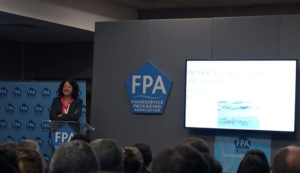Cater For You has been a member of the Foodservice Packaging Association for a number of years and was pleased to be able to attend their environmental seminar for a second year in a row. The event is not just a industry speaker event, but also gathers in views from a full spectrum of opinions and influencers. We think we keep up with events, for example we were one of the first (if not the first) to put recycling logo information on our product pages, introduce a dedicated biodegradable section, but we wish to learn more and continue pushing forward.
This seminar was scheduled as the issue of plastics in the oceans, product recyclability and litter is quite rightly huge news. Below are some notes as we were able to jot down with the odd commentary in order of scheduling. The first few presentations were pitched at showing the industry (us) how bad the litter and plastic pollution is in the UK and further afield.
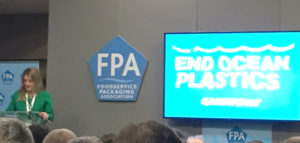 Elena Polisano – Greenpeace
Elena Polisano – Greenpeace
An excellent start to the day’s proceedings with a reality check on the amount of plastics that are finding their way into the oceans and case studies of the damage that is being done to our marine environment. Bullet points of Elena’s presentation included:
- Need to reduce or eliminate single use plastics
- Re-fillable systems to re-use
- Better recycling facilities
- Create a more sustainable future
- Areas which are inaccessible to humans have plastic waste
- Only 9% has been recycled globally
- 127 billion coke bottles have been produced
- Looking at Deposit Return Scheme (DRS) for 16 million bottles a day that aren’t being recycled
- 8 out of 10 people in the UK support a DRS
- 95% recycled where it is implemented
- Bans on plastics that cannot be recycled
- China has banned plastic waste, UK was exporting 2/3 of its plastic waste there
- UK has banned plastic microbeads
- Retailers are embracing the removal of plastics
Libby Peake – Green Alliance
Libby Peake from the Green Alliance introduced another angle of the current situation, the incentives for manufacturers to remove waste from the food chain, hurdles and suggestions of what needs to be overhauled to create a better environment for recycling and overall reduction in plastics usage. Bullet points from her presentation included:
- The Packaging Recovery Note system of recycling in the UK and export needs to be improved / reformed
- It only covers 10 % of overall costs and the overhaul needs to ensure that all costs are covered, also improved packaging design
- Local authorities pay most of the bills for recycling
- Businesses have no incentives to reduce waste in new packaging designs
- France has a system of ensuring unrecyclable products are not brought to market
- PRN prices for recyclable materials are highly volatile meaning local authorities cannot plan their longer term revenues
- Oil and hence plastic prices are also volatile meaning recycling market is constantly changing and being distorted
- 12% of PRN’s are openly traded and not audited
- Growth will have to come from domestic recycling which Libby was doubtful would happen as the current system favours exporting impacting domestic recycling facilities
- The UK is extremely vulnerable to the Chinese ban on imported recycling
Professor Margaret Bates – Chartered Institute Waste Management
Possibly our favourite presenter of the day with facts, pragmatism and superb delivery of content. The points we noted from the speech were:
- Avoid single use plastic waste where possible
- Identify who is responsible in the whole life cycle of plastics – manufacturers, retailers, local authorities and consumers
- Most of the pollution of the seas does not come from the UK / Europe but Asia
- Does increased awareness mean increased knowledge (particularly resonated with the attendees)
- Back to the fundamentals of why are we using packaging – protect, performance and inform the customer
- The perception is that customers aren’t that interested in recycling
- Consumers aren’t aware of the increased shelf life, safety and nutrition that is provided by the packaging
- The governments 25 year plastic plan aims to end avoidable plastic waste by 2042 using reform of the PRN system, taxes for recycling / waste infrastructure and plastic free aisles
- She called on the government to be braver on waste management
- UK has the highest ‘on the go’ consumption, but waste infrastructure hasn’t kept pace
- Only 46% of local authorities provide ‘on the go’ recycling
- 25p per cup levy would reduce usage and improve recycling revenue
- PRN needs to be overhauled with producer responsibility – a modulated fee, recycled content incentives, design for re-use and recycling
- Remove export incentives
- For the future, the circular economy needs to be embraced, the whole chain including consumers need to take responsibility and mandatory OPRL (on pack recycling logo)
Following on from this presentation, we had two speakers to discuss the role of compostables vs biodegradables which we found very interesting and a great way forward for on the go food packaging implementing the ‘soil to soil’ circular process:
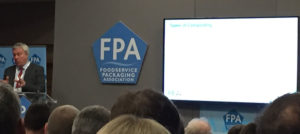 Charlie Trousdell – Organics Recycling Group – Renewable Energy Association
Charlie Trousdell – Organics Recycling Group – Renewable Energy Association
- Food and green packaging waste are both composted in the same open windrow facilities
- Currently over 5 million tonnes are processed this way
- 50 UK sites can take food and green mix including compostable packaging
- Certified packaging is not a problem
- Have to make sure the packaging is genuinely compostable – certification of finished product not just the material
- 13 million households currently have food collection, 10 million can use compostable bags
At Cater For You we have seen an explosion in demand for the compostable materials, but they should be composted at the correct facilities rather than just thrown into landfill.
 David Newman – BBIA
David Newman – BBIA
- EU is banning OXO biodegradable plastics in the near future
- UK is currently only recycling 35%
- Bioplastics are biodegradable and compostable
- Bioplastics are grown and returned back to the environment after use – the Soil to Soil principle
- Labels need to be compostable too otherwise are left over in the composting
- Compostable bags are compulsory in France
- Compostable materials are only around for 10-15 years
- Issues are contamination of the compostable materials with plastic products
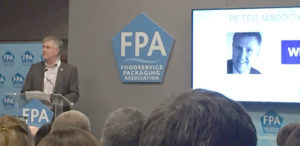 Peter Maddox – WRAP
Peter Maddox – WRAP
WRAP are the Waste and Resources Action Programme and are leaders in waste reduction and the circular economy. The key points noted from this presentation were :
- Need for an ‘on the go’ recycling strategy
- Need to implement a circular economy package
- The first presenter to introduce CO2 / carbon footprints and noted the large overall footprint of meat
- Need to reduce food waste through packaging
- Need to address plastic leakage through packaging design, local authority collections, consumers, recycling facilities and government regulation
- New plastics economy by the Ellen MacArthur Foundation being launched in Spring 2018
- Greater consistency in household recycling by local authorities, some are locked into long contracts and each local authority has different doorstep recycling schemes
- WRAP has personnel seconded into DEFRA to help government
- No unobligated companies in the PRN
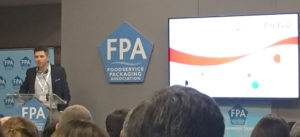 Mick Brown – Coca Cola Sustainability
Mick Brown – Coca Cola Sustainability
A blue chip manufacturer is always a highlight of the presentations to hear what they are doing at the sharp end of consumer and environmental focal points. This interesting presentation was how they are looking at the issues of their products being recycled more widely and more re-usable solutions:
- They have an ambition to recover their food packaging
- Sell over 7 billions drinks in the UK per year
- They use 150,000 tonnes of packaging
- 2/3’s of this is collected for recycling
- 1/3 of the plastic is on its second life from recycling
- The bottle is more lightweight, recyclable and using recycled plastic
- Plastic bottle recycling has risen from 30% to 57%
- They acknowledged they have to do better at ‘on the go’ recovery
- They are looking at various plans to deliver and improve these rates of recovery
- Coca Cola Freestyle – using a reusable bottle in fixed locations – example was of Reading student campus where bottles were bought for £40 and credit is built in and can be used from an app and can be filled up from various vending machines meaning less use of single use bottles with unlimited refills
- They are willing to be part of a deposit return scheme (drs) but it has to be well designed for success, pay as you throw
- The drs has to be simple for shoppers and households, focused on consumer beverage packaging, just one scheme (not for profit), fraud control, underpinned by legislation, convenient for collection points (often small shops with little storage room).
- He noted that the drs will produce some winners and some losers
The last point in the winners and losers of a DRS scheme, we believe that the local authorities recycling revenue / finances are underpinned by the collection of plastic bottles as they are valuable, so removing them from this and putting into a DRS scheme may take away from local authority door step recycling collections in future – which would be a huge setback.
Anne Hitch Recoup – Recycling of Used Plastics Ltd
After the composting / soil to soil theme, this (to the writer) seemed to be a bit archaic with a video about a trial of recycling EPS foam products where consumers were encouraged to wash the plastic and then recycle. This seemed like a completely impractical solution for on the go food packaging recycling. The only notes we made were :
- Need to increase levels of recycling in the UK
- The EPS project improved recycling rates
- Pledge4plastics work to improve recycling and services for recycling in the UK
- Need to provide an end product market for recyclable plastics
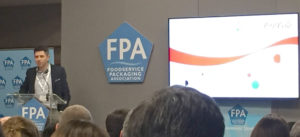 Peter Goodwin – Simply Cups
Peter Goodwin – Simply Cups
Peter also presented at last year’s conference where he was in the eye of the response from the recycling industry to the coffee cups storm that had just broken. He introduced a number of themes from his view of the closed loop environmental solution business:
- Beverage bin collection scheme in Cornwall this summer, trialling better facilities to improve response rates – Circular Cornwall Initiative
- Need for the recycling industry to add value to local authorities as they have no money to invest
- Create a bridge for the missing link between collection and recycling facility
Panel Q & A
A short Questions and answers session took place whilst we waited for the arrival of Lord Deben, the key points noted were:
- Behaviour change needs to happen across all of the chain
- Defra last spring announced a campaign to make littering unacceptable within 10 years
- Great British Spring Clean being organised by Keep Britain Tidy in 2018
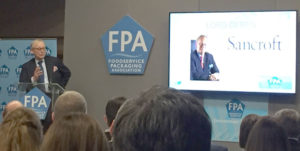 Lord Deben – Valpak
Lord Deben – Valpak
Lord Deben is John Gummer, former Minister of Agriculture, Fisheries and Food, Secretary of state for the environment in the 90’s and introduced the PRN. He / Valpak / Sancroft has been recruited by the FPA to help bring the industry together and work with everyone to improve all aspects of the packaging industry (as noted above). Key bullet points from his talk included:
- The Chancellor of the Exchequer has promised to introduce a tax on packaging
- Industry needs to use this money to help change behaviour and improve recycling facilities rather than straight into government finances
- Use the tax as an extension of the PRN system
- The PRN needs overhaul, including making sure everyone pays – packaging importers were singled out here
- Need to increase the value and reduce price volatility of recycled material
- Use tax to put in more collection bins
- Investment in recycling facilities and less cross contamination
- Ensure local authorities have consistent recycling and make it more identifiable whether it is recyclable to the end user
- PRN cannot favour exporters of our waste
- No country has successful DRS and kerb side collections
- 74% of bottles are currently recycled
- Pay more for non recyclable products eventually squeezing them out of the waste equation
- All businesses should have a recycling facility
The day’s seminar finished at this point. We found it tremendously useful again and there was a definite consolidation of thought and ideas from the previous year where the industry was caught out in the headlights of the media and consumer glare. These ideas need to be taken forward without recklessly implementing short term fixes for media headlines to be seen to be doing something. The government has 25 year targets, but the leaders in the room were confident that it was possible to transform recycling and reduce plastic usage in a much shorter timescale.
Please note that this is a write up from hand written notes on the day. If there is a known error from our note taking, please let us know and we’ll update this article.


